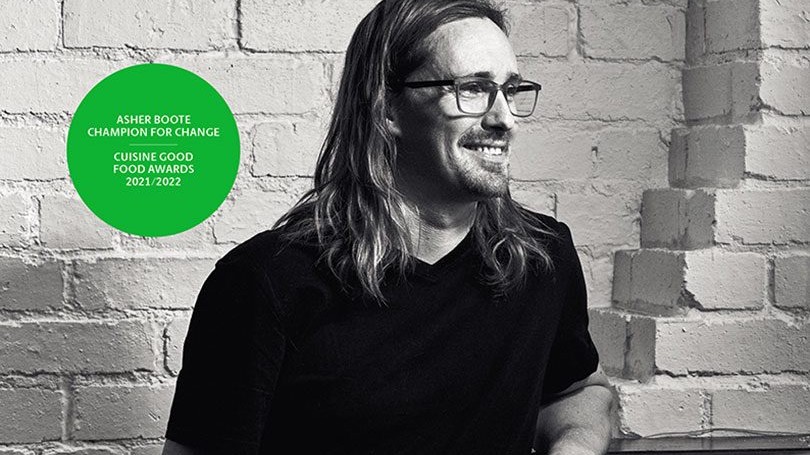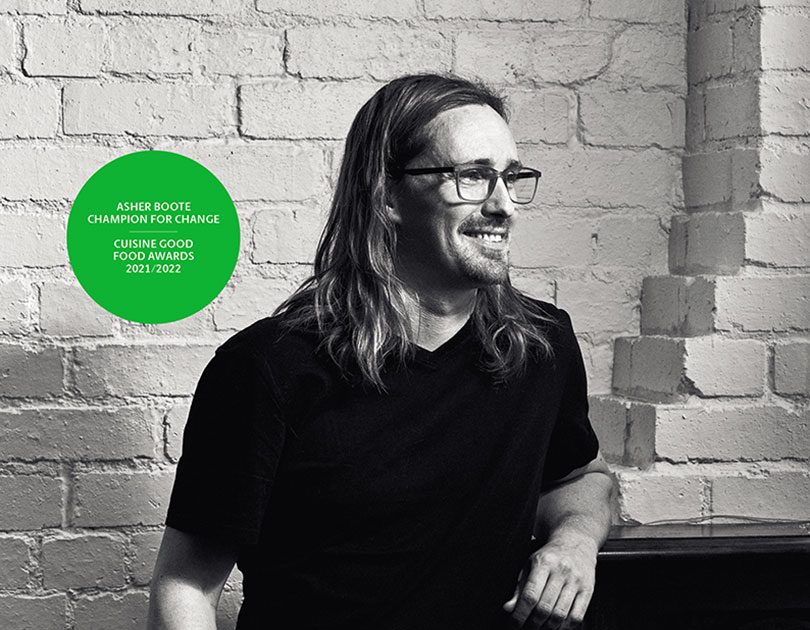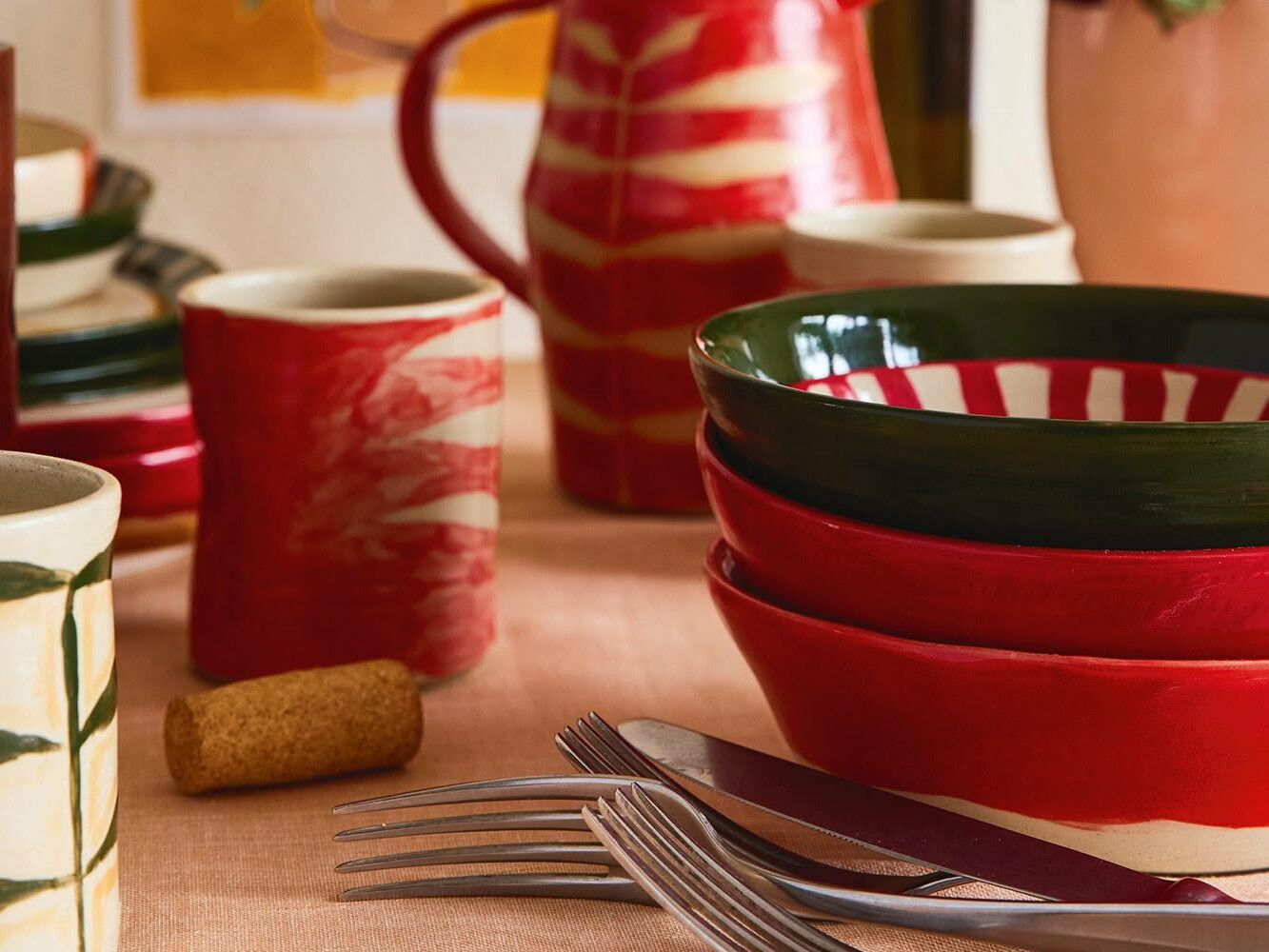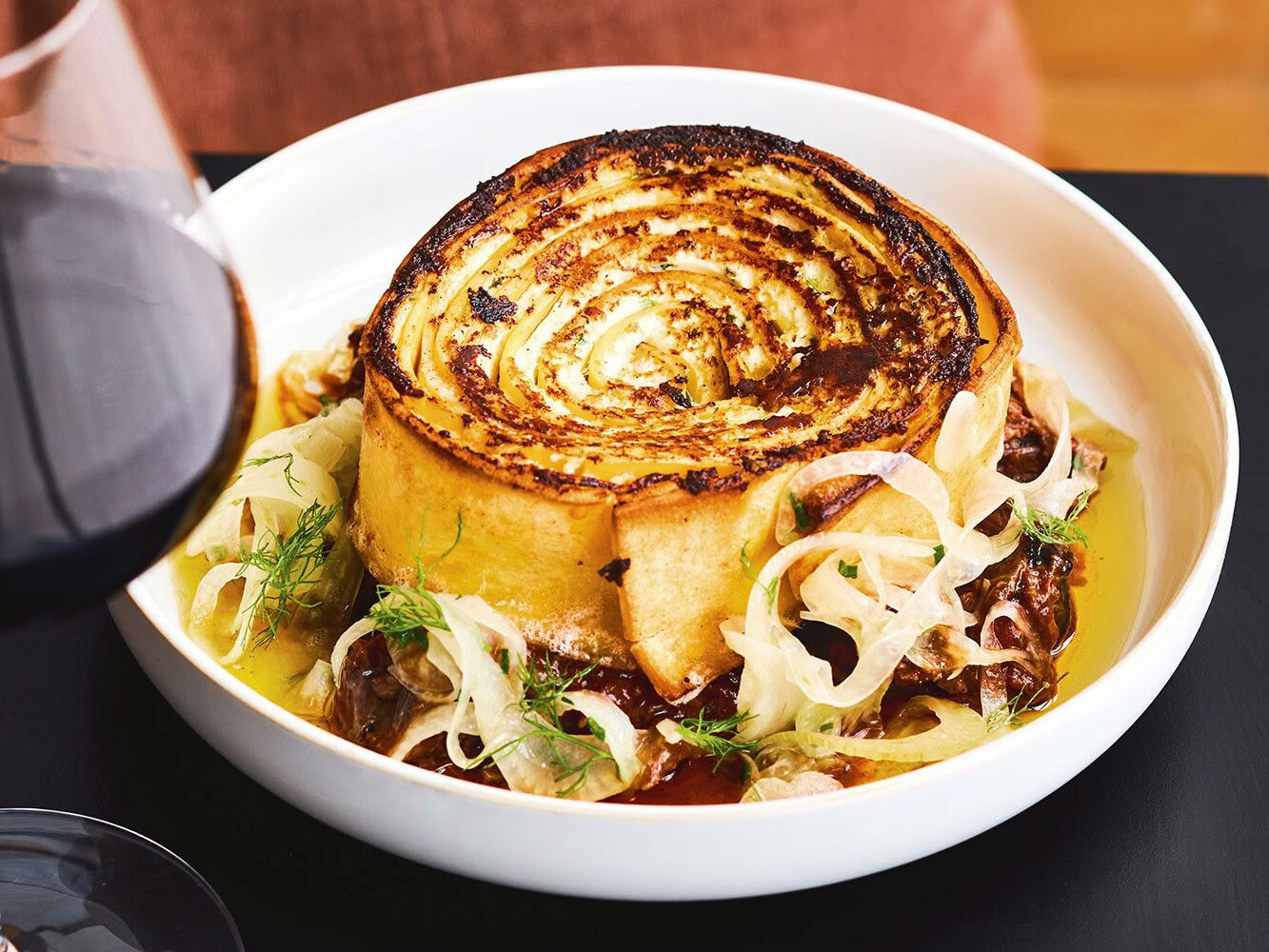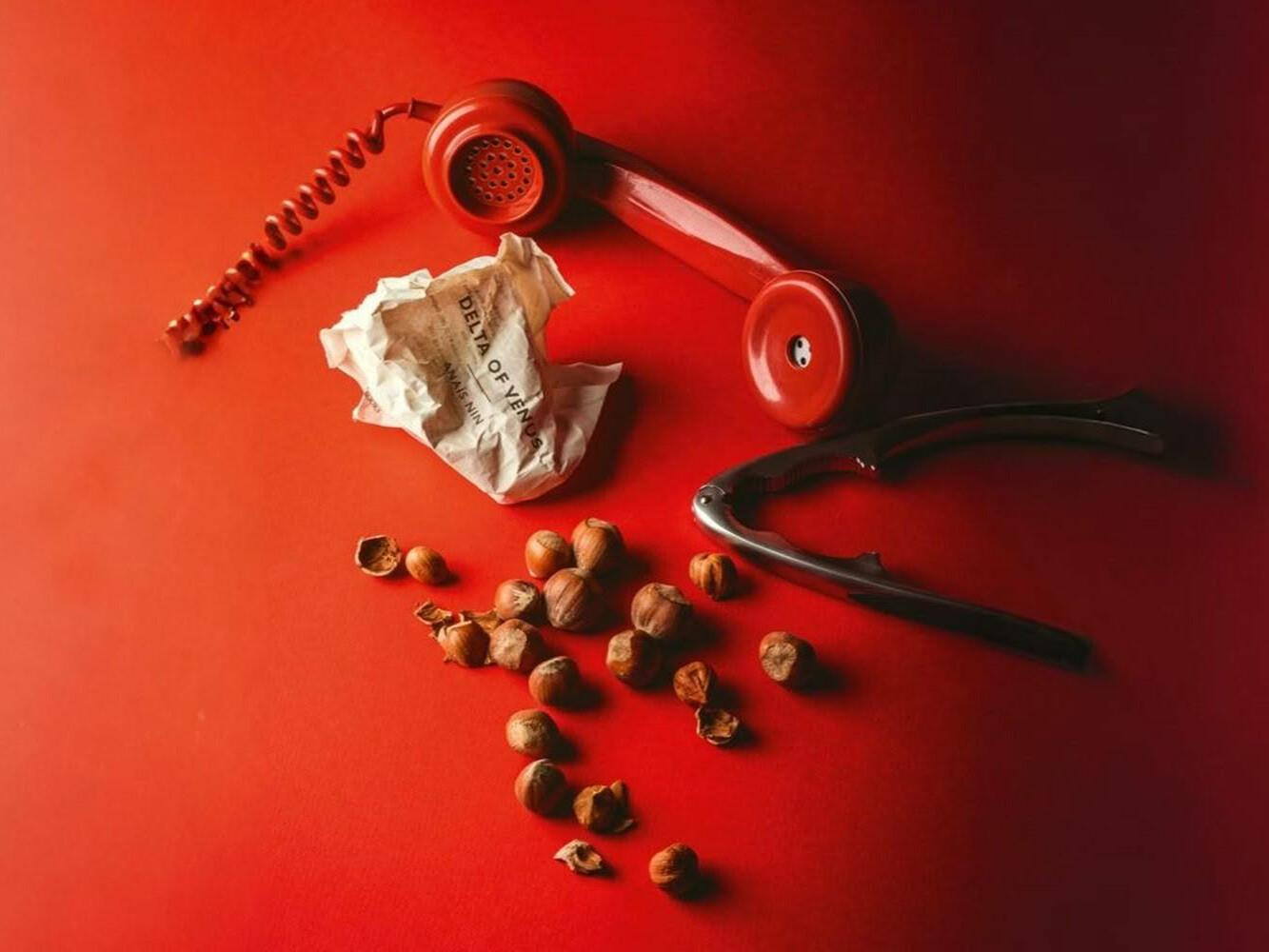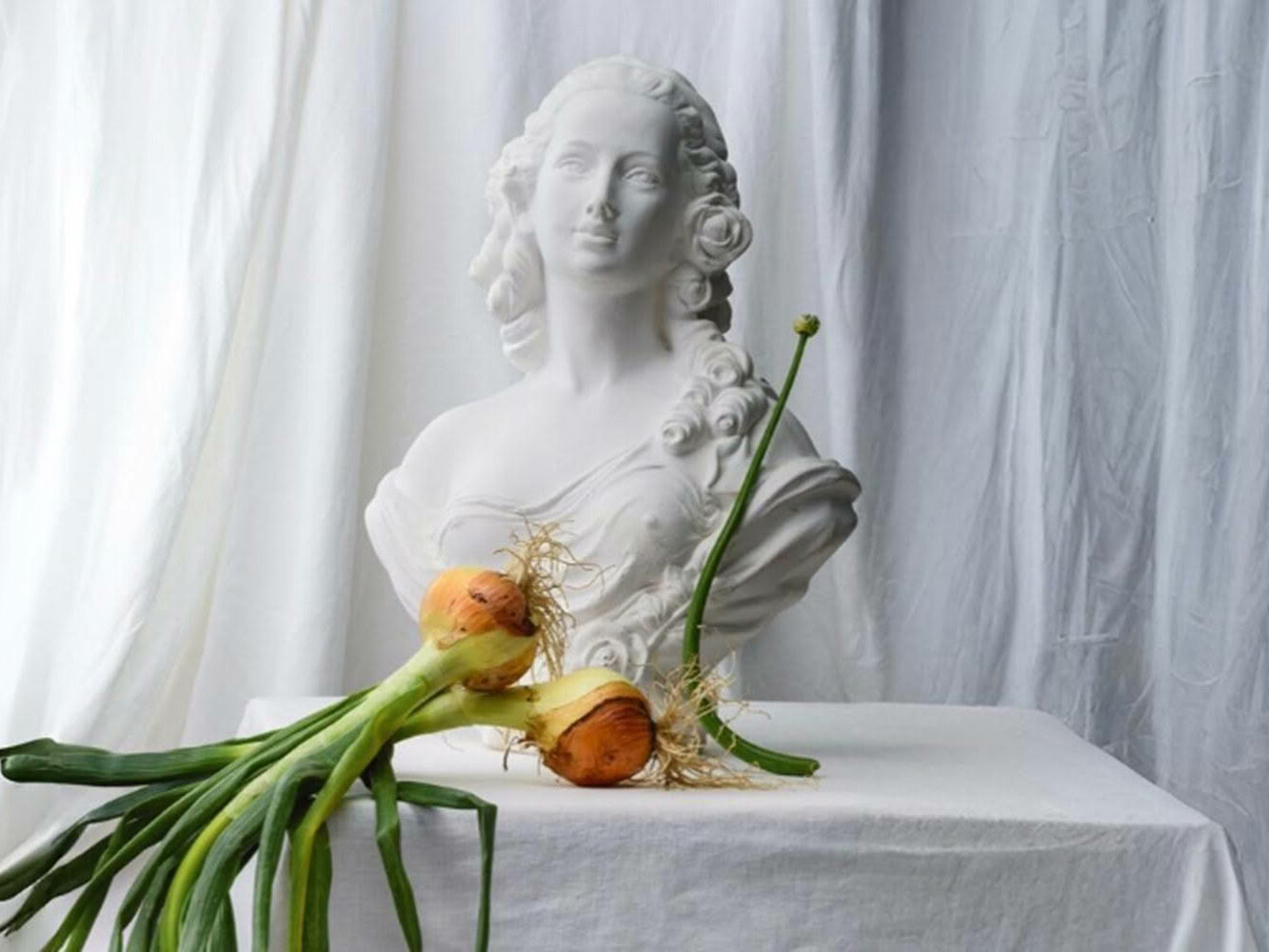Taste, animal welfare and sustainability are just some of the issues to consider when choosing meat. Geraldine Johns asked some top chefs to introduce us to their favoured suppliers.
Take a look at our top restaurants and you’ll see just how important it is to ensure that the meat we eat drives a New Zealand success story. But it goes beyond a name and a plate. So what is the winning formula? We’ve spoken to some of our Cuisine Good Food Guide award-winning chefs to ask why they source what they do and from whom. In an industry where there are options aplenty, it soon becomes apparent what good taste and dedication – right from the very start – is all about. From the wildest outdoors to the farm gate, let our chefs celebrate their suppliers’ stories.
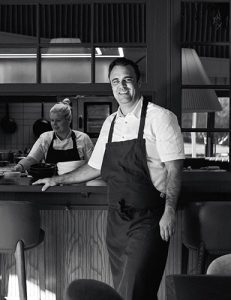 CASEY MCDONALD,
CASEY MCDONALD,
CRAGGY RANGE RESTAURANT, HAVELOCK NORTH
PORK
See Casey’s pork recipe Pickled pork, almond cream, charred cabbage & mandarin dressing
Casey likes to keep things in the community. So he needed to look no further than the Holly Bacon Company, 10 kilometres down the road in Hastings, as his exclusive supplier of pickled pork.
His “absolute ripper” of a dish is partly courtesy of its Holly origins, he says. By his own description, the company – which was founded in Germany – makes and does everything properly. It’s been that way in Hawke’s Bay since 1914, when Holly Bacon was established by Carl Vogtherr. Great-granddaughter Claire Vogtherr now continues the family traditions of using handmade brines, as well as natural wood-smoking and drying processes.
The first time he tried Holly’s pickled pork, Casey nearly fell off his perch. “I thought to myself, ‘Where has that come from?’ I felt like I’d been missing it all my life.”
Pickled pork done the Holly Bacon way stays a lot more moist and tastes almost like ham. Then it gets the added Craggy magic. “When you’re eating pork, sometimes you can have diner fatigue, with stuff such as pork belly. That’s why we use pickled pork; we’re trying to make something delicious with something everyone can get – but in a different way.”
Pickled pork is usually partnered with pūhā, he adds. “This is a nice way to use a pretty humble ingredient. We’re trying to elevate it and surprise people. The pork is silky and rich and lends itself to a really sharp mustard.”
It’s not just the fact that Holly is local that he loves; the company is also really consistent in everything it does. “It’s easier and nicer to deal with a local family.”
The company’s connections run deep. The Vogtherrs were actively involved in starting the Hawke’s Bay Farmers’ Market with Sir Graeme Avery and continue to be involved today. The family is now into its sixth generation of the pork-butchering business.
hollybacon.co.nz, craggyrange.com/restaurant
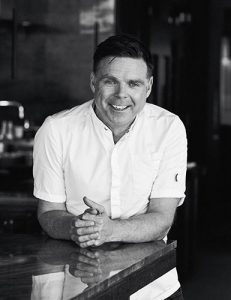 BEN BAYLY,
BEN BAYLY,
AHI, AUCKLAND
WILD GAME
See Ben’s wild game recipe Wallaby tartare
If anyone is game for a challenge, it’s Ben Bayly and he has the perfect meat partner to promote that notion. Ben has made it his mission to educate our palates about the myths and misunderstandings around wild meats and that’s reflected in his menu at Ahi in Auckland. There you’ll find wild pig, tahr, red deer, fallow deer and wallaby, all courtesy of Premium Game, from whom he sources all his wild meat supplies.
The Blenheim-based business is a licensed supplier of 100% wild game meat. The beasts have truly lived on the wild side: no captivity, no live transport, no abattoir. And they are completely free from hormones and antibiotics. A team of registered hunters harvests wild game from the South Island high country and the fully integrated operation controls all aspects of the supply chain from start to finish.
The proof lies on the plate. “People think that game tastes gamey, and that’s not the case,” says Ben. “Professionally hunted game has a real clean taste. Premium Game is choosing the best animals; it’s handling the meat in the best-practised way.” Game is a pest in New Zealand, he adds. “We’re doing the world a huge favour by eating it.”
The meat from Premium Game is lean, highly nutritious, organic and biodynamic, says Ben. “It’s the best meat to put in your body.” It works both ways: the animals are leading their best lives, too, running wild and free. Ben, who has been out hunting with the Premium team himself, says the relationship goes beyond chef and supplier “[Owners] Darren and Nick Clifford have become my friends.”
Ben’s wild game tartare starter is a firm fixture on the Ahi menu. “The first thing that people put in their mouth is a great responsibility: this is a real scene-setter.”
premiumgame.co.nz, ahirestaurant.co.nz
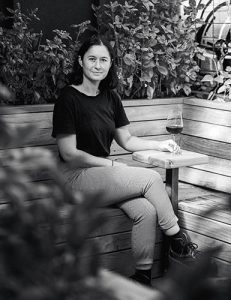 GEORGIA VAN PREHN,
GEORGIA VAN PREHN,
ALTA, AUCKLAND
LAMB
See Georgia’s lamb recipe Lamb rump, mint, seaweed sauce, soused spring onion & sheep’s yoghurt
The restaurant is on Auckland’s Karangahape Road; the lamb is dispatched all the way from the Otamita valley in Southland, 20 kilometres west of Gore. That’s all due to Georgia van Prehn’s exacting demands for perfection.
Origin South lambs are born and bred on one farm and slaughtered when they’re deemed to be at their best, says Georgia. “This, for me, equals a premium product where the lamb is not in distress. Origin South meat is a product that really speaks with the environment, due to it not being moved around, and this corresponds with our ethos here at Alta. The meat is perfectly tender and a great colour.”
There are no secrets when it comes to this part of the industry; most diners want to know the ethical and sustainable credentials of what’s on their plate. As far as the Origin South story goes, that means no antibiotics, growth hormones or genetically modified organisms. It’s also halal-certified.
Talk about a family affair: the fourth-generation farm has been in the premium meat business for more than a century. Logan Evans and wife Nicole are owner/managers of the Mt Peel property and they live on the 3300-hectare site with their three young children. Logan’s parents, Rex and Hilary, still work on the farm, too. “We ensure every lamb that enters Origin South is a wether or ewe, so no ram lamb makes it in.” (A ram lamb can taint the meat, Logan explains).
“Our family feels a strong connection to this land and we are proud of what we produce; we’d like this product to be seen as a gift from our family to yours,” he adds.
To honour that gift, Georgia serves the lamb rump medium rare. And, keeping with that ovine theme, she often serves it with sheep’s yoghurt, which, she says, has a funkiness to it that cow’s yoghurt doesn’t. originsouth.com, 366krd.co.nz
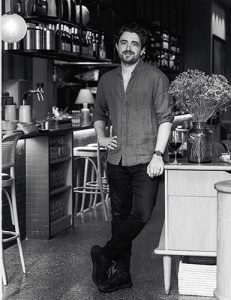 ALFIE INGHAM,
ALFIE INGHAM,
HUGO’S BISTRO,
AUCKLAND
BEEF
See Alfie’s beef recipe Roasted Matangi beef rump cap, ragu of spring vegetables with wild onion butter & anchovy cream
Life would be oh-so easy with one big ordering platform, says Alfie Ingham. But it’s the human element – not to mention the environment – that counts for him. “I’m always trying to find small suppliers who I can work with more directly; it’s far more interesting for me.” And that’s what’s behind the “bloody brilliant beef” that he sources from Matangi Angus Beef in Hawke’s Bay.
He’d been searching for a long time to find beef that ticked all his kitchen and sustainability boxes. He found it at this family-owned cattle station, which is small, sustainable and environmentally conscious.
It was more than love at first sight when Alfie first had a mouthful. “It was one of those lightbulb moments. It was everything you wanted: it’s got marbling, it’s got the proper dry-aged flavour, but it’s still tender and juicy and delicious.”
Matangi meat is genetically selected. The company breeds its own closed herd and doesn’t butcher before 24 months. The meat is not for export; indeed, it’s only available six months of the year locally.
Alfie likes that boutique exclusivity (he won’t use any other beef when Matangi is not available). He notes that his suppliers could jam-pack their farm with more cattle, but in the interest of quality, they choose not to do so.
And he just loves everything it delivers. “Matangi’s ethos meets with the way I think about food and the way I like to cook. I’m a great chef and I could make average beef taste better than it is, but with Matangi, you don’t have to do that.”
This dish illustrates his love of keeping things simple: a few big flavours that complement each other. It allows him to respect the integrity of the beef and deliver one hell of punch: one with great depth. matangi.co.nz, hugosbistro.co.nz
 ASHER BOOTE,
ASHER BOOTE,
DAISY’S, WELLINGTON
CHICKEN
See Asher’s chicken recipe Poached Bostock Brother’s chicken salad with fine herb broth
There’s nothing like giving the good old humble chook a bit of a run-around to bring out the very best in flavour, says Asher Boote. The chef and owner of Hillside Kitchen and Daisy’s – both in Thorndon – knows what he’s talking about. He grew up on a King Country farm where what they ate was what they raised and grew. So he knows all about the difference in flavour between a chicken that has enjoyed a life with its feet literally on the ground and one mass-produced indoors in a cage.
While Hillside is plant-based, Daisy’s does more classic, bistro-style food. But, flesh or vege, Asher says, “It’s about being conscious about what you’re eating. We try, wherever possible, for our suppliers to be the makers or growers of our products, so there’s a direct connection.”
That’s why he chooses Bostock Brothers’ organic free-range chicken. Every time. At their Hawke’s Bay family farm, Ben and George Bostock raise chickens with no nasty chemicals, no antibiotics, no hormones and no genetic modification.
“First and foremost, it tastes better. Bostock’s lets the birds run around in its apple orchards. That movement helps the flavour develop. And the cooling process it uses – an air cooler – means less leaching. It really does make a difference.”
One of the biggest skills a chef can have is procurement: understanding your ingredients from source and coaxing those flavours out, Asher says. “So full credit to Bostock’s.”
He wants to up the ante, to go mainstream. “I like the idea of the majority of our ingredients being high-quality and accessible. If we can keep growing demand for sustainable, ethical produce [the way we’re going with free-range eggs], that becomes the norm.”
For the purposes of this piece, he’s doing poached chicken. Try it and you may find yourself repeating the praises of diners at Daisy’s. “The amount of times we get comments saying, ‘This is the most flavourful chicken we’ve ever had,’” says Asher. That is, if you source your chicken from the same supplier. bostocksorganic.co.nz, eatatdaisys.co.nz

